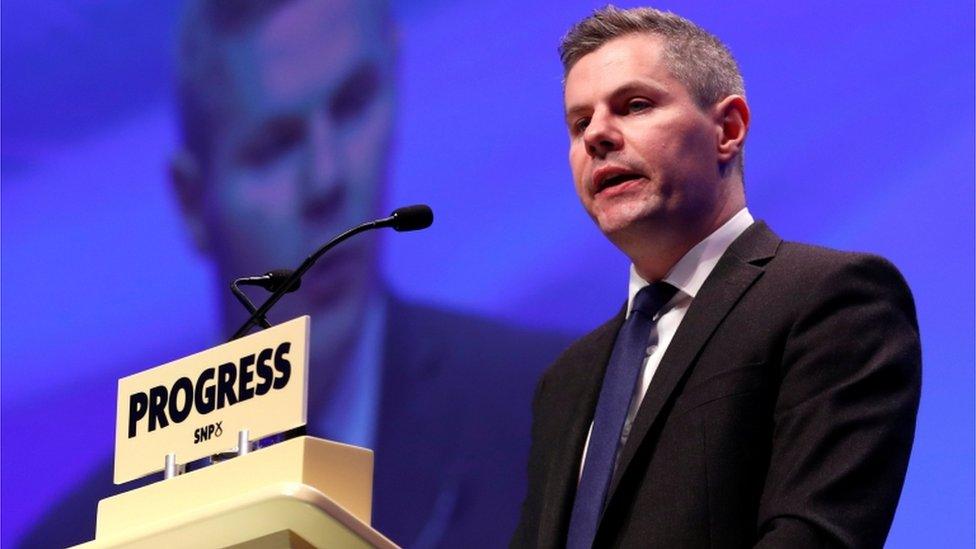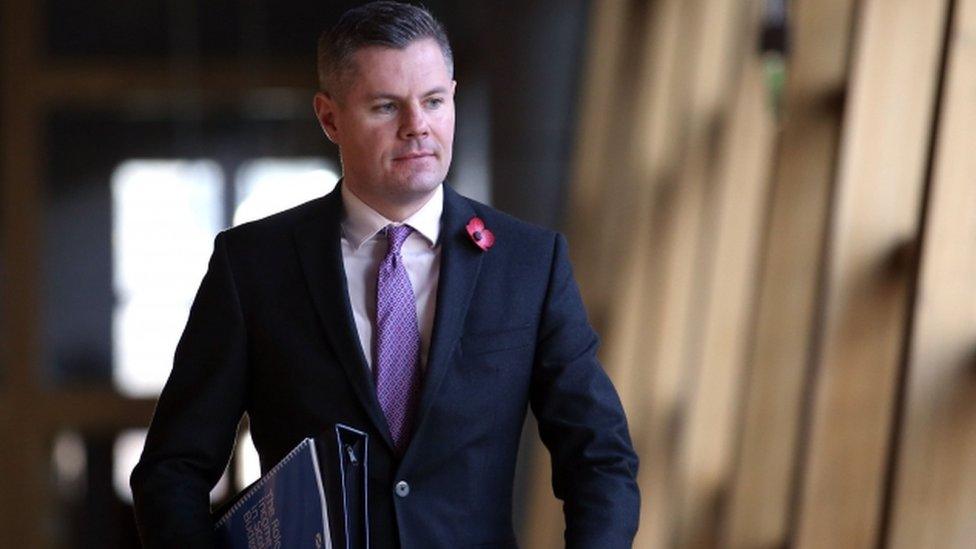Taxing questions ahead of Scots budget
- Published

Simple question: how do you alleviate poverty? Simple answer: by providing money to the impoverished individual.
More complex version. Who should supply the money with which poverty is alleviated? Over how long a period?
More complex version still. What will be the impact upon the wider economy of such actions? Will it permanently reduce poverty - and thus obviate the need for further transfers? Or will it entrench dependence?
It can be difficult, in truth, to shift political and public discourse beyond question one. However, there are welcome signs today of thinking which attempts to tackle questions two and three.
On Thursday, Derek Mackay will set out his budget for Scottish devolved governance. The finance secretary is widely expected to increase the level of Scottish income tax.
I say "level" advisedly because it is not immediately clear that he will alter the rates of income tax levied in Scotland, or at least not the basic rate.
The SNP remained the largest party after the last Holyrood election on a manifesto which promised to freeze the basic rate for the lifetime of the present parliament.
Don't see them breaking that. But, as widely trailed here, I think they will introduce at least one new band between the current basic and higher levies. They might also hike up the tax on top earners.
All of which means that the burden - the amount taken in tax - from Scottish wage-earners as a whole will increase.

Finance Secretary Derek Mackay has acknowledged that his budget comes amid "challenging circumstances"
Is that wise? Advocates of enhanced public spending say it is - and that, further, it is vital to mitigate the impact of UK-driven austerity.
John Dickie of the Child Poverty Action Group was on the wireless this morning urging investment / spending to help those in need (incidentally, I love the fact that the CPAG in London are based in Micawber Street - deft).
As you might expect, given his organisation, Mr Dickie focused upon increasing child benefit in Scotland. Challenged by the estimable Gary Robertson, he argued for a universal increase - even if, by definition, some of that cash goes to relatively wealthy parents.
Taxing questions
Now, there is a good argument to be had about universalism versus selection: the avoidance of stigma versus efficient distribution, and other elements. But let us focus for now on the wider questions I raised at the outset.
Mr Dickie made a powerful and cogent case for higher public spending, funded from Scottish taxation.
But yesterday, also on the wireless, we heard from Colin Borland of the Federation of Small Business. He voiced concern that his members - who mostly pay income tax rather than business taxation - might struggle if the levy rises, with a consequent potential impact on economic output.

Today we heard from the Fraser of Allander Institute, one of the lamentably few think tanks in Scotland. Despite the paucity of choice, FAI command attention with their thoughtful contributions.
They question why budget decisions have to be so seemingly short-term. Where, they ask, are the broader plans to "grow the economy and boost productivity"?
Their director, Graeme Roy, adds that "boosting Scotland's fragile economy will be crucial in helping to alleviate budget constraints over the long term." In short, you can't spend what you haven't got.
Growing growth
Now, there will be some who challenge the emphasis upon growth. They may argue that the economy should be more dependent on self-sufficiency, on living where possible within existing means, with a system of redistribution.
Others will perhaps focus almost exclusively upon redistribution, arguing that there is endemic unfairness in the social structure which must take precedence. Some of those will simultaneously consider growth, with varying degrees of interest, while others will tend to disdain or down-play the alternative argument that poverty will persist unless it is eliminated structurally by economic advance rather than temporarily by fiscal transfer.
Others still will talk endlessly about growth - paying perhaps relatively little regard to those who are left behind in its pursuit.
Is it feasible that we might engender a political and public discourse in Scotland where those who advocate public expenditure also consider the issue of how that cash is to be raised while those who argue for fiscal restraint are invited to contemplate the impact of their choice?
- Published12 December 2017

- Published10 December 2017

- Published11 December 2017

- Published7 December 2017
